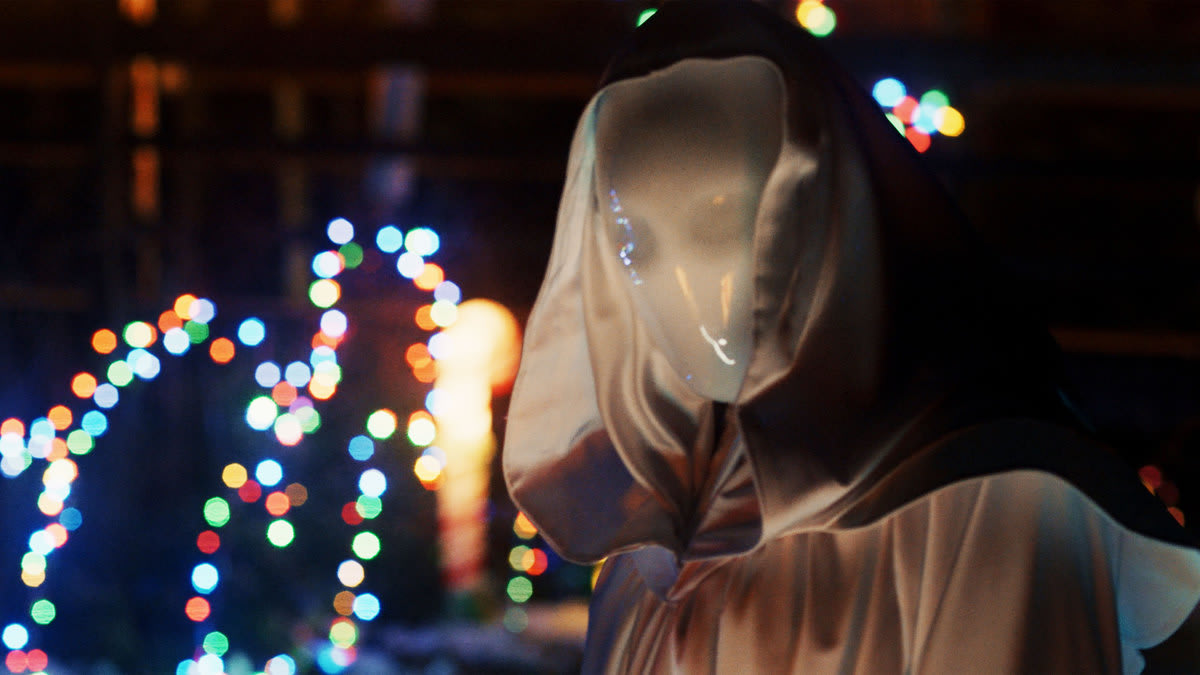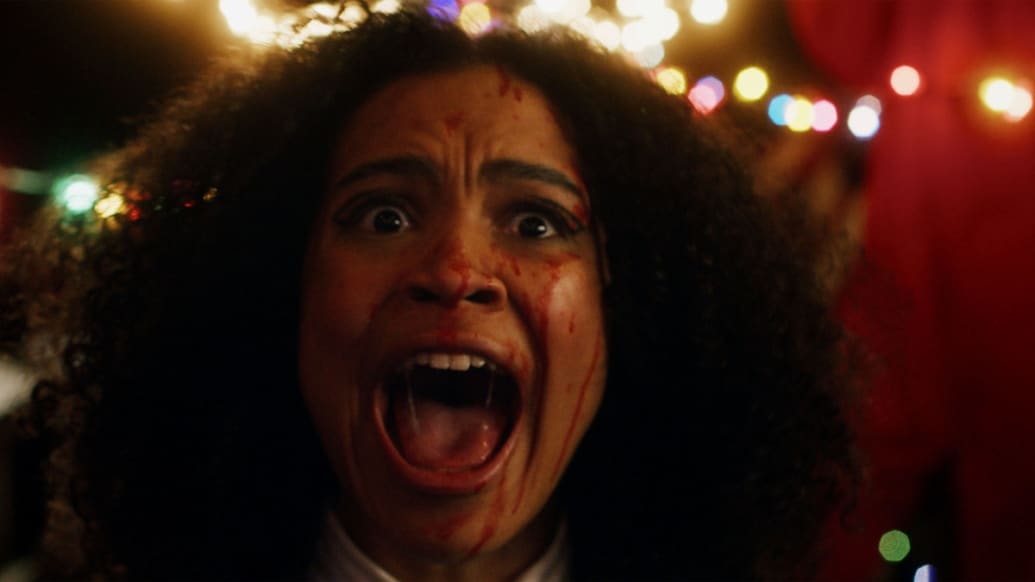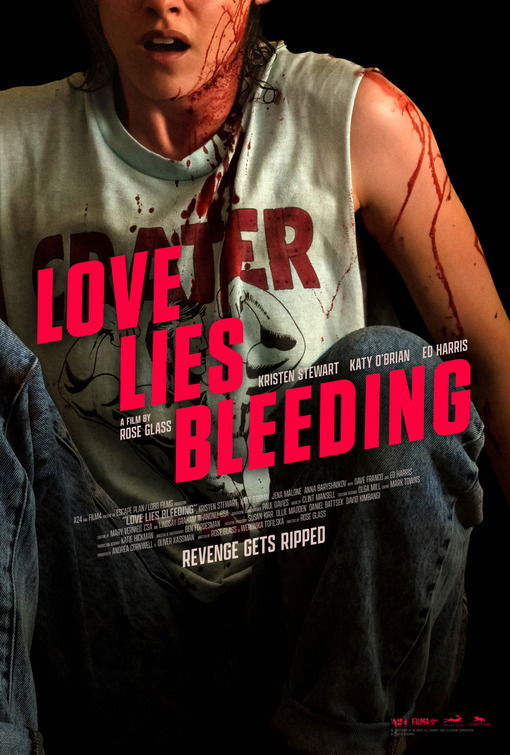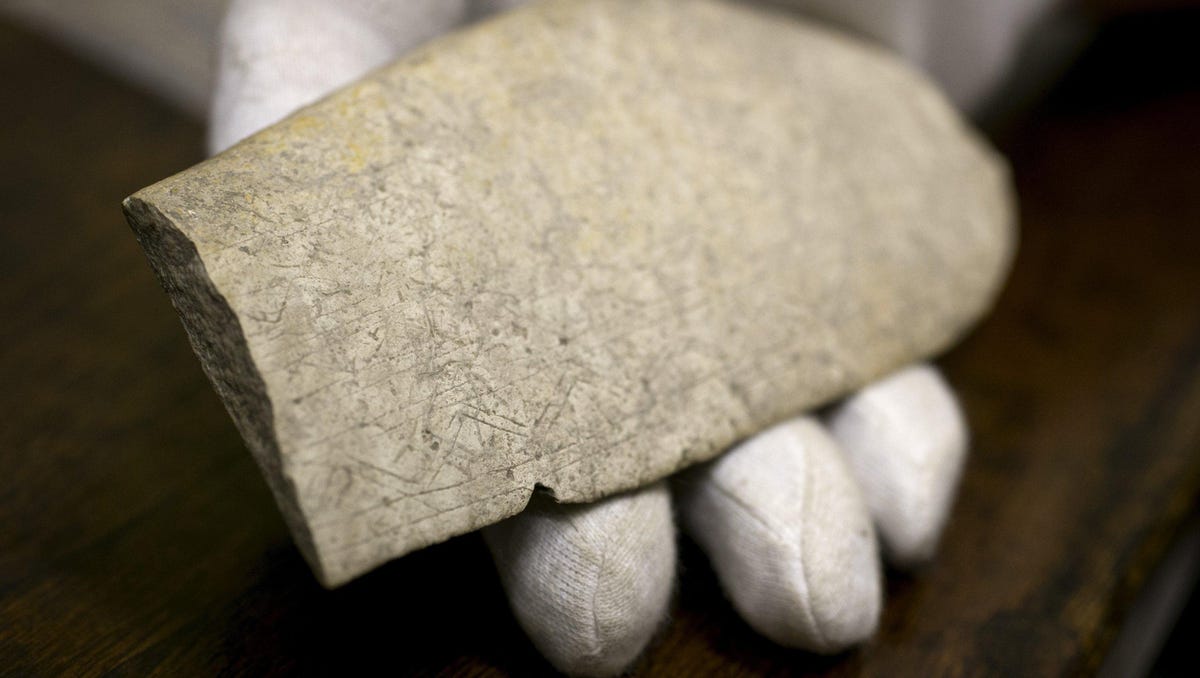Movie Reviews
‘It’s a Wonderful Knife’ Is a Big Lump of Coal

The title of It’s a Wonderful Knife (in theaters Nov. 10) doubles as the film’s elevator pitch: It’s Frank Capra’s classic of Yuletide magnanimity, reimagined as a holly-bedecked horror flick. Easily enough said and sold, but actually following through on the snappy logline proves more convoluted than in the recent ready-made slasherfications of Groundhog Day (Happy Death Day), Freaky Friday (Freaky), and Back to the Future (Totally Killer).
A masked assassin stalks the snow-blanketed hamlet of Angel Falls, and when he strikes at a house party on Christmas Eve area teen Winnie (Jane Widdop) gets the drop on him with a pair of jumper cables and a car battery. As dictated by the code of Scooby-Doo, the culprit is the grabby developer (Justin Long) with the displeasing Joel Osteen dentures, and he’s dispatched in short order.
One year later, however, Winnie’s not feeling all that jolly. Her workaholic dad (Joel McHale) gifts her annoying brother (Aiden Howard) a car while she’s stuck with an insulting monogrammed scale. Then she catches her beau doing mistletoe-type things with another girl. While staring at the aurora borealis—at this time of year, in this part of the country?—she wishes she’d never been born, and finds herself in a still-terrorized town that makes Pottersville look like Pleasantville.
Courtesy of RLJE Films and Shudder
That’s about a half-hour of wind-up in an 87-minute movie, and neither scribe Michael Kennedy nor director Tyler MacIntyre (currently having an eventful month as a cowriter of Five Nights at Freddy’s) do much to make merry with the premise they’ve worked so hard to gift-wrap for us. Drably photographed, leadenly unfunny, and flimsily assembled, this seasonal trinket has a white-elephant disposability liable to send viewers rummaging for a receipt.
Following the tiresome, obligatory adjustment period during which Winnie wonders why nobody’s recognized her since right around the time she willed herself out of being, she gains her Clarence—a parallel explicitly stated with dialogue, for anyone stumped by the title’s seeming non sequitur—in social outcast Bernie (Jess McLeod). Via the freeze-dried bantering of YA lit, they go from unlikely partners to besties to could-it-be-something-more, one strand in a queer streak that also extends to Winnie’s with-it aunts and OnlyFans-trawling brother.
The spirit of updated inclusivity fits right in with the subversive revisionism inherent in spattering a Christian observance with arterial spray, though Kennedy and MacIntyre also hold fast to Capra’s warming wholesomeness. The preordained finale taps into the same catharsis of redemptive second chances linking Scrooge, The Grinch, and George Bailey. It’s just that in Winnie’s case, the true meaning of Christmas amounts to ditching your suck-ass boyfriend to hook up with the cute, misunderstood girl who can see the real you.
The contrast between rosy-cheeked sentimentality and violence sharpened to an icicle’s point could’ve been played for big laughs, or at least laughs bigger than Winnie’s repeated reaction of “Seriously?!” to shocking sights. (Anna and the Apocalypse had a better handle on this bit, going all in on chipper holiday dissonance with its upbeat, zombie-strewn musical numbers.) Like the latest It Toy cleared off the shelves, charm is in short supply for this film; there’s no texture or character to its cheapness, the rickety DIY gumption of low-budget genre filmmaking replaced by a stifling digital sterility starved for light and pops of color. Even a pair of scenes at unsupervised ragers lack any sort of festive charge, as if to illustrate the difference between a party and a bunch of people standing in a room while music plays. If all this is meant as a riff on the thinness and Kinkadean hideousness of mass-produced Hallmark originals, the self-awareness fell off the sled somewhere along the way to Grandmother’s house.
In search of a resolution to tie a ribbon on everything, MacIntyre and Kennedy get bogged down in metaphysical horse pucky that doesn’t really make sense—though, to be fair, neither does the ending of It’s a Wonderful Life. Capra waved away the logistics with high-proof pathos, and glossed over the fact that Bailey’s life had not materially improved through the uplifting powers of populist camaraderie. So long as we’ve got our health and our loved ones, we’ll muddle through somehow—the same chestnut cracked by our hero as she comes to appreciate the one cool girl in her town. Remember, Winnie: No man is a failure who has a crush that likes them back.

Courtesy of RLJE Films and Shudder
But a moral skirting the maudlin must be duly earned, otherwise it’ll feel as grafted-on as the romance used here to implant a heart in a film more taken with the structuring device than the soul of its main inspiration. Anyone can borrow a setup famed for extracting tears around this time of year, and deviously turn it on its head. Doubling back to actually pull it off takes a Christmas miracle.

Movie Reviews
LOVE LIES BLEEDING Review

LOVE LIES BLEEDING is a modern-day, highly immoral, sleazy take on the film noir genre. It features a graphic lesbian relationship, numerous scenes of graphic violence, substance abuse, and abundant foul language. The movie has a twist-filled script, fast pacing and gritty performances, but it repulsed the vast majority of moviegoers at the box office.
Dominant Worldview and Other Worldview Content/Elements:
Vicious, promiscuous, totally immoral movie filled with violence and sex, especially lesbian sex;
Foul Language:
At least 78 obscenities (including 65 “f” words), three strong profanities using Jesus Christ and a gross scene where a woman has to unclog a clogged toilet;
Violence:
Numerous people are shot in graphically bloody fashion with sickening wounds and shocking sound effects, woman shoots another woman in the head and causes blood to splatter all over the camera, woman beats a man to death, woman breaks that man’s jawbone wide open as she slams his head repeatedly into a table, abused wife is hospitalized by a particularly brutal yet offscreen beating that leaves her face severely bruised and swollen, another character tortures this woman by pressing hard against her facial injuries, woman shoots another man in a shootout then shoves the barrel of her gun into his mouth, takes the gun back out but smashes the gun into his face to kill him, and a woman is shown waking up from a seemingly fatal gunshot wound, but another woman chokes her to death and dumps her body in the desert;
Sex:
Graphic lesbian sex scenes, particularly showing oral sex, the sex is shown promiscuously on a one-night stand, and later another lesbian blackmails one of the lead lesbians into having relations with her (though this is only implied and discussed, not shown), movie opens with a man having forceful, adulterous sex with a woman from behind in the back of a car, and a lesbian sucks on her girlfriend’s toe;
Nudity:
Several lesbian sex scenes feature female breasts and buttocks but no genitals, another lesbian woman is shown standing with full rear nudity after an implied sex scene, and shirtless men are seen working out in several scenes;
Alcohol Use:
Adults frequently drink alcohol, with one scene showing a woman drunk;
Smoking and/or Drug Use and Abuse:
A woman smokes cigarettes frequently, a female bodybuilder severely abuses steroids throughout, leading to violent outbursts and her vomiting onstage in front of a crowd, and the steroid injections are shown in a sensuous fashion;
Miscellaneous Immorality:
Lying, double-crosses, deception rampant throughout, with a dehumanizing use of violence.
LOVE LIES BLEEDING is a modern-day, highly immoral, sleazy take on the film noir genre that centers on a graphic lesbian relationship, numerous scenes of graphic violence and an abundance of foul language. LOVE LIES BLEEDING has a twist-filled script, fast pacing and gritty performances, but should not be viewed by anyone.
The story centers upon a lesbian woman named Lou (Kristen Stewart), who is estranged from her vicious father Lou Sr. (Ed Harris) yet works managing a decrepit gym he owns in their desert town. Meanwhile, a female drifter named Jackie (Katy O’Brien) arrives in town and immediately engages in back-seat, adulterous sex with JJ (Dave Franco), who’s married to Lou’s sister Beth (Jena Malone).
The backseat liaison results in a job for Jackie at a gun range on the edge of town owned by Lou Jr. She’s just saving up money to finish a trip to Las Vegas for a women’s bodybuilding championship, and when she flexes her massive muscles, Lou is instantly attracted to her.
The two soon engage in a tawdry sexual relationship, but Lou’s happiness is abruptly halted when Beth winds up in a hospital after a vicious (offscreen) beating at the hands of JJ. Lou Sr. wants to keep it all in the family rather than report JJ to the police, which angers Lou greatly.
Jackie has been abusing steroids in order to build muscle for her upcoming competition, and flies into a murderous rage that results in her brutally killing JJ. When Lou and Jackie dump his body in an enormous pit in the desert outside of town, a string of double-crosses explodes as Lou Sr. is determined to find out who killed JJ and federal agents start asking Lou lots of questions about his potentially criminal enterprises.
Can Lou manage to bring her father and his illicit crime machine down? Is Jackie a serious love interest or a con artist using her for her own ends?
LOVE LIES BLEEDING has excellent performances from all of its cast, who bring a wide array of seedy characters to vivid life. Also, Director/Co-writer Rose Glass keeps the twists coming fast and furious throughout the movie’s bonkers second half.
Despite the technical skill with which it’s made, LOVE LIES BLEEDING is a movie that has literally no characters to support and no sense of legal justice – just brutal vigilante revenge meted out several times over. Even Lou becomes utterly reprehensible and heartless by the end, and the movie’s entire mood is demoralizing and dehumanizing.
Packed with graphic violence, sex and nudity and an abundance of foul language, LOVE LIES BLEEDING is utterly distasteful and a must to avoid for viewers of all ages.
Movie Reviews
Love Child (2024) Movie Review & Ending Explained: Can Love and Sacrifice Keep Ayla and Paolo’s Family Together?

Rom Coms, the ones that match the endearing and intelligent with equal fluency, have a scintillating flavor. The book of tricks to make a romcom sing and soar may have admittedly gone jaded and dog-eared. The crises of couples, dilemmas, and anxieties they have to battle have undergone dramatic changes in a fast-evolving world. Expectations vary with the decades, even as gendered rules haven’t dented much.
The urge to steal a leaf or two from every standard template Hollywood romcom is immanent in any new derivation. It becomes a constant tussle, hence, for a new film in similar spaces to eke out freshness and smarts. Jonathan Jurilla’s directorial “Love Child” (2024) has little to add or say anything genuinely sparkling. It’s a weary distillation of parental exhaustion and re-alignment, too silly to pass off what it views as clever self-reflexive remarks.
There are basic cardinal rules a romcom must ensure is upheld. Conflicts should ideally resonate across a demographic; humor needs to exist in spades. A helping of self-awareness goes a long way in establishing a winking playfulness. The best rom-coms sail through these assumptions with lightness and spryness.
Love Child (2024) Plot Summary & Movie Synopsis:
Ayla and Paolo’s Journey of Love, Sacrifice, and Resilience
Ayla (Jane Oineza) and Paolo (RK Bagatsing) are young parents. Incidentally, the actors themselves are a couple in real life, who call the film a “free trial” to parenthood. Ayla and Paolo have been exultant about becoming parents but what awaits them is a whole lot of instability, fraught periods of testing faith in each other to weather the hardships of raising their child, Kali (John Tyrron Ramos) who is diagnosed with autism. It’s this diagnosis that opens the film and sends their lives into a tailspin. The two have fought with their families on several counts to realize their togetherness. Dreams have also been put on hold. Paolo is a filmmaker who desires to make it big but naturally meets resistance from his father, from whom he has cut loose.
They arrive in the Philippines to put up at the house that Ayla’s aunt has offered. They don’t have to worry about rent, an exponential anxiety hence taken care of. The first thing they get done is to enroll Kali at a school for children with support needs. They hope he can be addressed with due attention and be given proper time, nourished in a safe, loving, and understanding community.
How Far Will Ayla and Paolo Go to Secure a Future for Their Son?
Of course, things don’t go as smoothly. The money to raise the child is immense, formidable, and persistent. It’s no small task. To exacerbate matters, the couple has no savings to lean on. Ayla has just a small income from a virtual assistant job and Paolo has barely any gigs to draw a livelihood from in the Philippines.
At home back in Australia, opportunities were, at least, higher. Sources of supporting themselves stand a chance. The couple start a coffee cart as an added source of income. Even that isn’t enough. Customers are few. To run the cart is its own demanding affair that strains their purses more than they expected it to.
One night, Kali falls terribly sick. His parents rush him to the hospital, where medical expenses surge. Where will the couple find the money to foot the bill? They are at wit’s end. Pao assures Ayla not to worry. He’ll dredge out a way. However, when he is away scavenging for a source, Ayla already turns to her mother who lends her the needed money. He is angry with her because Ayla’s mother has been refusing to recognize Kali as her grandson. She tells him, if they waited longer, they’d be staring at an added day of hospital expenses.
Love Child (2024) Movie Ending Explained:
Do Ayla and Paolo find a way of raising their child?

Ayla and Paolo are compelled to employ specialized teachers and attendants for Kali. The cost of living becomes exceedingly high. How can they afford it? Ultimately, they edge toward the pained but necessary realization that they have to live apart at least for a while. If that’s the only way they can build a decent future for Kali, they can’t ignore it. What’s significant and decisive is both Ayla and Paolo are wholly committed to being there for Kali, no matter what it takes, as well as underscoring the need to go out and chase their individual aspirations.
Yes, she must pursue her dream of being a lawyer. The climax is a wistful one, with Paolo leaving for Australia where he would brush aside his bruised ego and accept his father’s job offer. He takes the marks of his wife and child, remnants of them he’d carry with him as he moves into an uncertain, yet hope-tinged future in Australia. They part ways with a promise of return. They know he’ll be back when the time is right and resources have accrued enough to carve for them a comfortable life together.
Love Child (2024) Movie Review:
“Love Child” lacks a fundamental, driving vitality and energy. It is only inconsistently curious and sporadic in its plunges into human indecision and the fear of failure. What is that projection we induce when we feel we are turning into reflections of our parents, a reality most horrific and to skirt clear? To encounter such a realization is depressing and upsetting.
The central pair of the film have to negotiate and move past reservations and a bundle of fears popping up. They are opposed to seeking the help of their parents, who have never sided with them in big decisions, but they also understand the need for a bigger family their child ought to have. Having just his parents wouldn’t suffice for Kali to rely on. For his sake, the parents have to look past their grudges and learn to forgive and let go of ill will.
Read More: 15 Best Netflix Original Horror Movies
It’s a question of need and learning to trust again those who have failed us, giving them another chance without being bogged down by ego and justified anger and disappointment. But the film never pads this vital realization of the parents well to land its ultimate point. “Love Child” dwells lightly on vast conflicts as these, papering them over with a convenient switch.
This is why the hardship and everyday strife don’t hit as deeply as they ought to. “Love Child” leaves you pining for a more textured understanding of the complex bonds of care between the couple and their child, who is bereft of any dimension other than his support needs. The film takes a blinkered, dull view and yet bungs in a slapdash discovery of the importance of a larger family.
Love Child (2024) Movie Trailer:
Love Child (2024) Movie Links: IMDb, Rotten Tomatoes, Wikipedia, Letterboxd
The Cast of Love Child (2024) Movie: RK Bagatsing, Jane Oineza, John Tyrron Ramos, Milton Dionzon, Mai-Mai Montelibano, Jaden Biel Fernandez, Chart Motus, Mary Jane Quilisadio, Mandy Alonso, Tey Sevilleno
Love Child (2024) Movie Runtime: 1h 40m, Genre: Drama
Where to watch Love Child
Movie Reviews
Movie Review | Bleakness of Iceland adds to horror tale

Despite the so-so storytelling, the work here by Palsson piques your interest as to what the native Icelander will make in the future.
Subscribe to continue reading this article.
Already subscribed? To login in, click here.
Originally Published:
-

 Health1 week ago
Health1 week agoNew Year life lessons from country star: 'Never forget where you came from'
-
/cdn.vox-cdn.com/uploads/chorus_asset/file/24982514/Quest_3_dock.jpg)
/cdn.vox-cdn.com/uploads/chorus_asset/file/24982514/Quest_3_dock.jpg) Technology1 week ago
Technology1 week agoMeta’s ‘software update issue’ has been breaking Quest headsets for weeks
-

 Business5 days ago
Business5 days agoThese are the top 7 issues facing the struggling restaurant industry in 2025
-

 Culture5 days ago
Culture5 days agoThe 25 worst losses in college football history, including Baylor’s 2024 entry at Colorado
-

 Sports5 days ago
Sports5 days agoThe top out-of-contract players available as free transfers: Kimmich, De Bruyne, Van Dijk…
-

 Politics4 days ago
Politics4 days agoNew Orleans attacker had 'remote detonator' for explosives in French Quarter, Biden says
-

 Politics3 days ago
Politics3 days agoCarter's judicial picks reshaped the federal bench across the country
-

 Politics2 days ago
Politics2 days agoWho Are the Recipients of the Presidential Medal of Freedom?


















